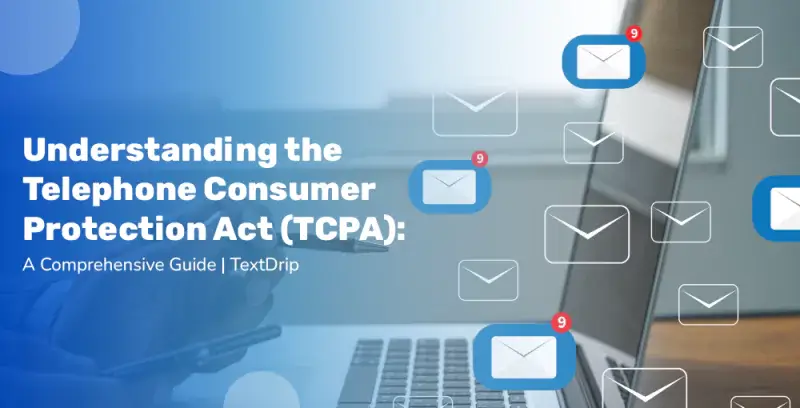01 Aug 2022
Dhaval Gajjar

01 Aug 2022
Dhaval Gajjar
The Telephone Consumer Protection Act (TCPA) has been in place since 1991. The purpose of the TCPA is to safeguard consumer privacy. It restricts individuals from placing telemarketing calls and using automatic telephone dialing systems and artificial or prerecorded voice messages without consent from the consumer.
Since it originated in 1991, the TCPA has been modified to include Text Message Marketing. The TCPA requires that individuals obtain consent from the consumer before sending SMS messages, telemarketing calls, auto-dialed calls, pre-recorded calls, and faxes.
TCPA is enforced by the Federal Communications Commission (FCC) and must be followed by all individuals.
Everyone. Everyone must adhere to the guidelines listed under TCPA.
1. Calling/Texting individuals listed on the National Do-Not-Call Registry
2. Placing a marketing call or text without prior express written consent from the recipient first
3. Delivering artificial voice calls (robocalls) or recordings to residences without prior express written consent
4. Using autodialers, recordings, or simulated voices to make calls to mobile phones or other recipients where the receiver pays for the call itself.
1. Any emergency telephone line or any emergency line of a hospital, medical physician, health care facility, poison control center, fire department, or law enforcement agency
2. To the telephone line of a guest room or patient room of a hospital, health care facility, elderly home, or similar establishment
3. To any telephone number assigned to a paging service, cellular telephone service, specialized mobile radio service, or other radio common carrier service
Regardless of having consent to communicate with a consumer, the TCPA has restrictions that are in place and must be followed. These restrictions include:
1. Contacting any residential telephone subscriber before the hour of 8:00 a.m. or after 9:00 p.m. (consumer’s local time zone)
2 Contacting a consumer whose telephone number is listed on the National Do-Not-Call Registry
3. If a consumer asks you to stop texting/calling them, you must honor such requests immediately. Continuing to contact the consumer is a direct violation of the TCPA.
4. SMS messages are recommended to include clear opt-out instructions (i.e., STOP, UNSUBSCRIBE, END, CANCEL, QUIT), giving the consumer a way to easily opt-out of receiving future messages.
In addition to identifying phone numbers belonging to a landline or numbers belonging to litigators known litigators, Landline Remover can identify phone numbers on the National Do-Not-Call Registry.
Easily check numbers before you make contact by running the phone number through Landline Remover before calling/texting. Please visit www.landlineremover.com for more information.
To help you maintain compliance with the TCPA, we have automatically enabled a Drip Time Window on every Textdrip user’s account. This feature will automatically prevent messages from being sent out during the hours of 8:00 p.m.-8:00 a.m. EST.
If a message in your campaign is scheduled to go out past 8:00 p.m. EST, the system will automatically pause the message and send it out after 8:00 a.m. the following morning.
Users do have the option to disable the Drip Time Window feature; however, by doing this, the user is disabling the safeguard feature, and messages will not pause if they are scheduled to go out past 8:00 p.m.
Users who disable this feature are 100% responsible for ensuring that they remain in compliance with the TCPA rules and regulations regarding permissible messaging times.
Violating TCPA regulations can result in fines of $500 per violation and up to $1,500 per willful violation. However, these amounts can vary depending on the severity of each case.
The information in this article is not meant to be legal advice. This is a general outline of some components of the TCPA. Individuals are required to educate themselves on all guidelines of the TCPA and ensure compliance.
If you need further assistance on the issue of TCPA compliance, contact a legal professional in your area. Textdrip is not responsible for violations of TCPA. Textdrip strongly advises you to research and familiarize yourself with all TCPA guidelines prior to SMS marketing. Visit the link below for more information on TCPA.